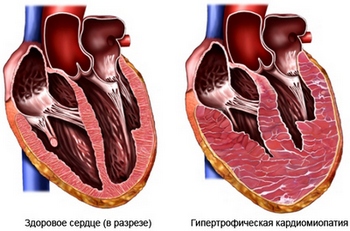Hypertrophic cardiomyopathy in adults
Description of hypertrophic cardiomyopathy
Gipertroficheskaya cardiomyopathy, or HCM, It is a form of cardiomyopathy. This condition, in which the heart muscle thickens due to genetic problems muscle structure. When the muscle thickens, it must work more, to pump blood. Sometimes, thickening of the muscle prevents the blood leaving the heart and causes a blockage. This blockage can lead to “protekaniю” mitral valve. HCM can cause uneven heart muscle, and in rare cases it can cause abnormal heart rhythms, that may even lead to death.
There are three main types of cardiomyopathy:
- Extended;
- Hypertrophic – It can be divided into two types of:
- Gipertroficheskaya obstruktivnaya cardiomyopathy (GOKM) – muscle between the two valves of the heart are so grow, that impede blood flow to the heart;
- Neprepyatstvuyushtaya prohozhdeniyu gipertroficheskaya cardiomyopathy – neprepyatstvuyuschaya passage of blood form of the disease, increased muscle is not big enough, to block blood flow;
- Restrictive form.
HCM can occur in people of any age. But, usually, the most severe cases occur in young people.
People, HCM patients are at increased risk of sudden death. Nonetheless, Many people with HCM live normal, healthy life, without experiencing unpleasant symptoms.

Causes of hypertrophic cardiomyopathy
Causes of HCM include:
- Gene, that causes abnormal growth of the heart muscle. It may be hereditary or the result of gene changes over time.
- Defektnыy gene, which controls the growth of the heart muscle;
- Viral infection.
People older 60 HCM years, likely associated with high blood pressure.
Risk factors
Factors, which increase the risk of hypertrophic cardiomyopathy:
- I have a family member with HCM;
- The presence of hypertension in older age 60 years.
The symptoms of hypertrophic cardiomyopathy
Symptoms include:
- Chest pain;
- Swoon, especially during exercise;
- Dizziness, especially after exercise;
- Cardiopalmus;
- Shortness of breath or difficulty breathing;
- General fatigue;
- Fatigue during exercise or activity, related to physical performance;
- Shortness of breath when lying down.
These symptoms may be caused by some other diseases, including arrhythmias (irregular heartbeat). Blocked or reduced blood flow, usually, It is the cause of dizziness, obmorokov, and shortness of breath.
Diagnosis of hypertrophic cardiomyopathy
The doctor asks about the symptoms and medical history, and performs a physical exam. Tests may include the following:
- Stress test – Tests on the body's response to physical exertion, which may help in detecting heart and lung problems;
- Echocardiography – It uses high-frequency sound waves (ultrasound), to examine the size, shape and motion of the heart;
- Transesophageal echocardiogram – for the detection of abnormalities of the heart is performed Photo;
- 24-hour Holter monitoring – Portable ECG recorder attached to the patient, to record heart activity during normal daily activities;
- Heart catheterization – catheter inserted into an artery in the groin to study heart chambers;
- Coronary angiography – after administration of the radiopaque dye into the coronary artery is performed radiograph, that allows the doctor to look for abnormalities and to evaluate the function of the heart;
- Blood tests;
- Chest X-ray – used, to take a picture of structures inside the body.
Treatment of hypertrophic cardiomyopathy
Treatment focuses on, to control symptoms and prevent complications. Treatment options include:
Medication
Drugs may be used, to help maintain proper and regular heart function. These may include beta-blockers and calcium channel blockers.
In the presence of an arrhythmia patient may need to antiarrhythmic drugs and blood thinners.
Surgery
The thickened portion of the heart muscle is cut and removed. It may be necessary, If blocked heart blood flow.
If the mitral valve is leaking, It can be operated for its repair or replacement.
Alcohol septal ablation
Alcohol is injected into the arteries of the heart thickened. This helps to reduce the blockage in the heart and improve blood flow from the heart.
Implantable cardioverter defibrillator (Idk)
IIR is implanted, if the patient is at increased risk of sudden death.
Prevention of hypertrophic cardiomyopathy
To prevent hypertrophic cardiomyopathy necessary:
- If you have a family member with HCM is necessary to have regular examinations by a cardiologist, for the early detection of problems with insertions;
- When you have high blood pressure you need to take medications and follow instructions and doctor's instructions.
